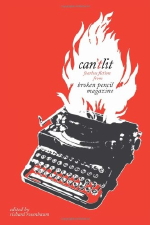 I’m not punk, or indie, or anything like that. There’s aspects of those cultures, or counter-cultures I guess (same thing, really), that I feel an affinity for, but they’re not really my scene. Indie culture is what Broken Pencil does, though, and therefore you’re not going to find much in the way of mainstream fiction in Can’tLit, and anthology of fiction from the magazine. That’s both awesome and frustrating.
I’m not punk, or indie, or anything like that. There’s aspects of those cultures, or counter-cultures I guess (same thing, really), that I feel an affinity for, but they’re not really my scene. Indie culture is what Broken Pencil does, though, and therefore you’re not going to find much in the way of mainstream fiction in Can’tLit, and anthology of fiction from the magazine. That’s both awesome and frustrating.
There’s two ways to think of taking risks in fiction. There’s the obvious way, which is writing against mainstream literary expectations, and I have a lot of respect for that, especially when it’s done here in Canada, because, well… yeah. CanLit can be boring and predictable as shit sometimes. Maybe even most of the time. (Rosenbaum’s foreword even starts with the words: “CanLit sucks.”) There’s a whole bunch of that in this collection; in point of fact most of the pieces could fall under that heading. Then there’s the other way, which is when an author writes against or outside of their comfort zone, and that’s a harder thing to do (and gets a hell of a lot more respect from me), and harder to determine from an anthology. The only person represented in this anthology whose work I’ve read before (aside from Hal Niedzviecki, who only wrote an introduction) is Zoe Whittall, and I don’t feel like I’ve read enough of her work to make a determination on that front.
Anyway, there are some great stories here, in particular “Amsterdam at Midnight,” which was very atmospheric, and though I can’t speak for that particular city, really captured being tired and awake and aimless in an urban landscape at night, that kind of echoey darkness, the cool stillness with the occasional flush of humidity. And then you’ve got Joey Comeau’s great “Giraffes and Everything,” which brings with it an unexpectedly dark catharsis, and Christopher Willard’s “Little Wite Squirel Angel,” which at first I kind of hated, because it stuck me as plucking at satirical low-hanging fruit, but then won me over as it became less an expression of class contempt and more an argument about media repositioning itself in our lives, and the class implications of that.
But in any anthology of forty-seven stories, they aren’t all going to be brilliant. And some of them really weren’t. There were several (I’m looking at you, “Dandruff”) that seemed kind of pointless, like someone said to themselves, “okay, stories are supposed to do X, so I’m going to do Y, even though Y doesn’t really make any sense and is kind of dull and meaningless.” In a sense that’s a stereotype of the punk ethos, and though one tries to avoid thinking in stereotypes, it’s hard to avoid with some of these stories.
Overall I enjoyed Can’tLit, and got to read some really daring stuff, but to be honest some of it felt like filler, present for attitude rather than quality. (In retrospect, that may have been part of the point; even the dimensions of the book are just unusual enough to be awkward.) The cover is gorgeous, though.
Can’tLit was my thirteenth and final selection for the Fourth Canadian Book Challenge.